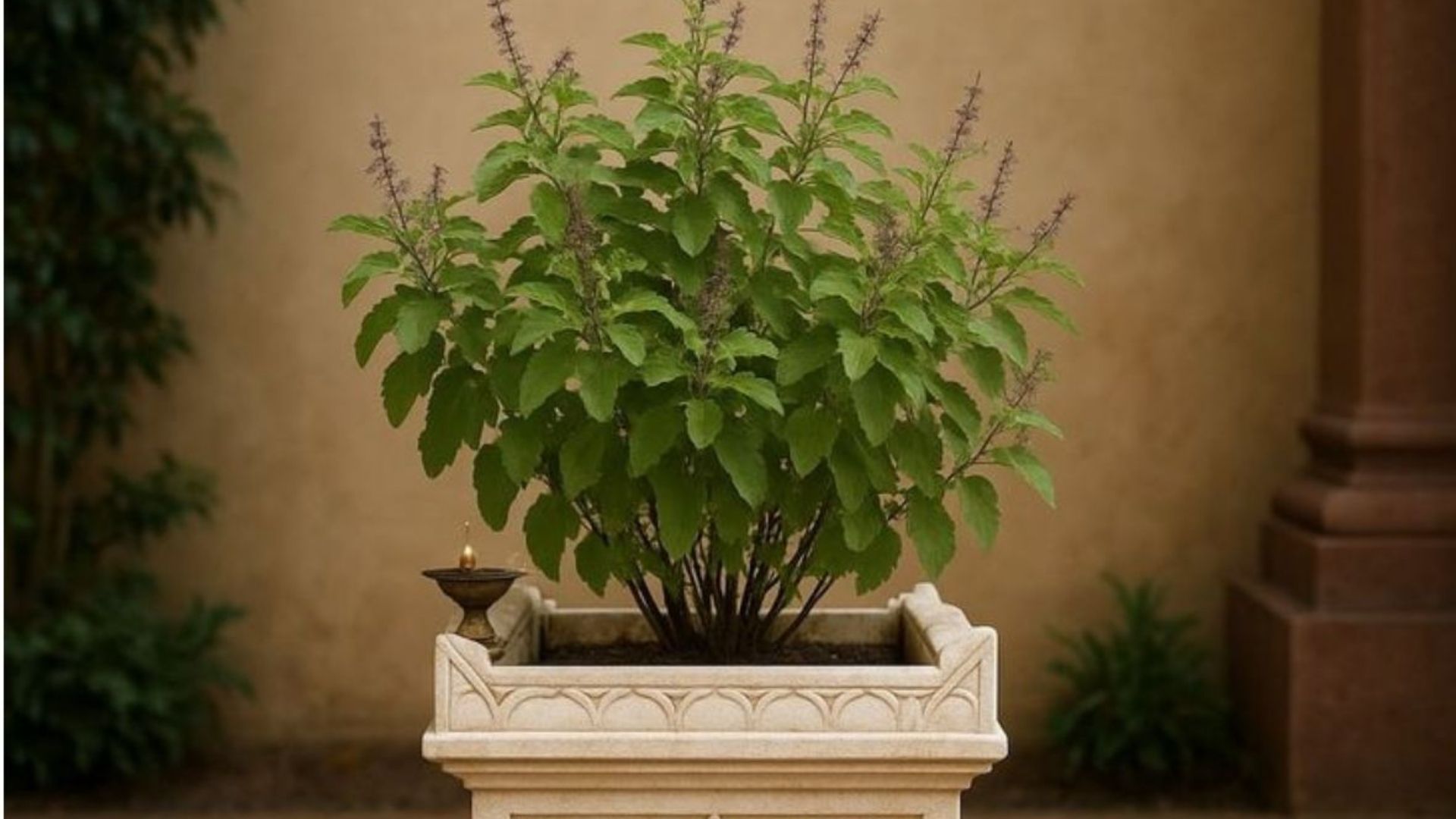Tulsi, also known as Holy Basil, holds a divine place in Hindu culture. Worshipping Tulsi Mata is believed to bring prosperity, happiness, and peace to one’s home. The Tulsi Ji Ki Aarti is sung to honor the goddess and seek her blessings. This sacred aarti fills the atmosphere with purity, positivity, and spiritual energy. In this blog, we will explore the importance of Tulsi Ji, the benefits of her worship, and the complete Tulsi Ji Ki Aarti lyrics in English along with their meaning.
READ MORE : https://digitalmohit.co.in/category/festival/
The Importance of Tulsi Mata in Hinduism
Tulsi, or Vrinda Devi, is considered an earthly manifestation of Goddess Lakshmi, the consort of Lord Vishnu. According to Hindu mythology, Tulsi Mata emerged to bless the world with her purity and devotion. Every Hindu household with a Tulsi plant is said to be blessed by the divine presence of Lord Vishnu and Goddess Lakshmi. The plant is not only sacred but also has great medicinal and spiritual value. People worship Tulsi daily, especially in the morning and evening, by offering water, flowers, and performing Tulsi Aarti.
READ MORE : https://digitalmohit.co.in/category/news/
Benefits of Worshipping Tulsi Ji
Worshipping Tulsi Mata regularly is believed to bring immense benefits, both spiritual and physical.
● Spiritual Purity: Tulsi worship purifies the heart and mind, bringing calmness and devotion.
● Peace at Home: Lighting a diya near the Tulsi plant every evening removes negativity and attracts peace.
● Prosperity and Health: Tulsi Mata blesses her devotees with health, wealth, and harmony.
● Protection from Evil: It is said that Tulsi wards off evil spirits and negative energies from the home.
● Gateway to Moksha: According to scriptures, offering Tulsi leaves to Lord Vishnu or Krishna is a way to attain salvation (moksha).
The Ideal Time for Tulsi Worship
Tulsi Mata is usually worshipped during morning and evening hours. Devotees light a lamp near the Tulsi plant and offer water, flowers, and incense sticks. A special day dedicated to Tulsi worship is Tulsi Vivah, celebrated after Diwali, symbolizing the divine marriage of Tulsi Mata and Lord Vishnu (in the form of Shaligram).
Tulsi Ji Ki Aarti (Lyrics in English)
Below is the complete Tulsi Ji Ki Aarti in English transliteration. You can sing or recite it during daily worship to invoke divine blessings.
Tulsi Ji Ki Aarti
Om Jai Tulsi Mata, Jai Jai Tulsi Mata
Paap Haro Bhaktan Ke, Tum Ho Shuddh Vidhata
Om Jai Tulsi Mata…
Jo Tumko Pujey Bhav Se, So Paavey Phal Data
Dukh Daridra Door Kare, Dhan Sampatti Data
Om Jai Tulsi Mata…
Tum Ho Vishnu Priya Sakhi, Tum Se Vishnu Raaji
Jo Bhave Tumko Bhav Se, So Bhavey Hari Aaji
Om Jai Tulsi Mata…
Tulsi Vivah Ke Samay, Sab Sukh Ka Sangam
Jo Kare Tumhara Poojan, Mile Hari Ka Sangam
Om Jai Tulsi Mata…
Tulsi Dal Hari Ko Bhave, Mukti Miley Jeev Ko
Jo Tulsi Ko Jal Chadhaave, Bhakti Miley Shiv Ko
Om Jai Tulsi Mata…
Tulsi Tum Jag Ko Tara, Sab Pe Tum Ho Pyari
Jo Bhave Tumko Man Se, So Bhave Narayan Pyari
Om Jai Tulsi Mata…
Tulsi Mata Ki Aarti, Jo Koi Nar Gaave
Sukh Sampatti Bhog Kare, Dukh Kabhi Na Aawe
Om Jai Tulsi Mata…
Meaning of Tulsi Ji Ki Aarti
The Tulsi Ji Ki Aarti glorifies the divine qualities of the goddess. Each verse praises her as a destroyer of sins and a giver of happiness. It highlights her eternal bond with Lord Vishnu and expresses gratitude for her blessings on devotees. Singing this aarti daily is said to bring purity, devotion, and good fortune.
Rituals During Tulsi Puja
Performing Tulsi Puja with sincerity and devotion can bring immense peace to your life.
Here’s a simple way to perform it:
- Clean the area around the Tulsi plant.
- Place a diya (lamp) filled with ghee or oil near it.
- Offer fresh flowers, incense sticks, and water to Tulsi Mata.
- Chant “Om Namo Bhagavate Vasudevaya” or recite the Tulsi Ji Ki Aarti.
- Bow down and seek blessings for your family’s health and prosperity.
Significance of Tulsi Vivah
Tulsi Vivah marks the ceremonial marriage of Goddess Tulsi and Lord Vishnu (as Shaligram). It is celebrated on Ekadashi or Dwadashi tithi in Kartik month. The festival holds immense significance, as it symbolizes the end of the monsoon and the beginning of the Hindu wedding season. Devotees decorate the Tulsi plant like a bride and perform the marriage rituals with sacred mantras.
Tulsi in Ayurveda and Daily Life
Apart from its spiritual value, Tulsi is known as the “Queen of Herbs” in Ayurveda. It has remarkable healing properties:
● Boosts immunity and respiratory health
● Reduces stress and anxiety
● Purifies blood and skin
● Improves digestion and energy
● Acts as a natural remedy for colds and coughs
















Leave a Reply